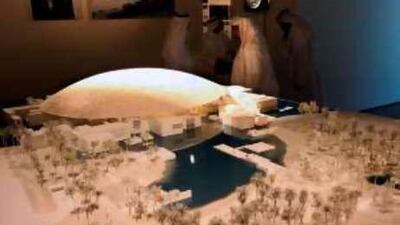It is now quite clear that the depth and breadth of this global pandemic, which began with defaults on US home loans, afflicted world banking and is now undermining growth in almost every industry worldwide, will leave no nation untouched. The UAE may be insulated to some extent by the oil windfall and a growing domestic economy, but in many ways the crisis comes at a bad time for this country. For Abu Dhabi, it comes at the start of a 20-year development plan whose ambitions were originally framed in an environment of growing global demand and liquid credit.
Under Plan Abu Dhabi 2030, the wilderness and islands around the capital will be transformed into new cities of gleaming towers, groomed golf courses, landmark museums and luxurious beach resorts. A new port will be built on an artificial island, industries will rise up around the country's natural-resource base and the population will triple, the planners say. Developments now under way in the capital alone are expected to cost Dh1.3 trillion (US$353.94 billion), a conference heard this week. Only a fraction of this has been financed so far because construction is only just beginning.
For Dubai, which is at least a decade ahead of Abu Dhabi in terms of economic diversity and infrastructure development, the global crisis comes when the emirate is embarking on an even more ambitious phase of growth. It is already home to the tallest building in the world and is firmly placed on the global jet-set's mental map. But the emirate is aiming higher, much higher. Just three master developments now under construction - Dubailand, Waterfront and Business Bay - are expected to cost upwards of Dh550bn.
Both the Waterfront, a city twice the size of Hong Kong with 1.5 million inhabitants, and Dubailand, three times the size of Manhattan with no less than 24 theme parks, are in their infancy. Such developments are closely tied to the national brands being developed by the Emirates, and are central to the long-term strategy of the country. Abu Dhabi, and by extension the UAE as a whole, is fortunate to have benefited from an oil windfall over the past few years. But those behind Plan 2030 or indeed Dubai's latest expansion never expected this money to be channeled directly into such projects.
Much of the nation's oil revenue is used to finance the costs of government and its services, while most of the balance is invested in markets abroad, where it is held in trust for future generations. Even when oil prices rose above $100 a barrel last year, much of these developments were meant to be financed with borrowed money. Developers borrow cash to buy land and pay contractors, contractors need loans to pay for materials and labour, and end-users need loans to buy homes and offices.
The plans in both Abu Dhabi and Dubai were always predicated on credit and, to some extent, growing global demand for housing, aviation, tourism and commodities. So the global economic crisis presents the UAE with a dilemma and an opportunity. First, it must identify how the crisis will materialise here. Second, it must identify sections of the plan which are no longer relevant or viable in this new world of tight credit and slower economic growth.
One of the first indicators of the slowdown was seen in the nation's stock markets, which have fallen 57 per cent in Dubai and 31 per cent in Abu Dhabi so far this year. This reflects a massive withdrawal of foreign speculative capital more than any slump in domestic demand, but it means that these markets no longer offer a source of capital for local expansion. After hitting a record at $147 a barrel, oil prices have also fallen by more than half. As in other countries, these shocks have spread to other sectors of the economy. Banks have resorted to emergency loans from the central bank and a highly speculative property bubble appears to have burst. Property developers complain of reduced cash flow. Even the Abu Dhabi Water and Electricity Authority, the state-run utility, said this week it had resorted to costly short-term loans to finance the construction of a desperately needed power plant.
Ratings agencies have looked closely at the solvency of the UAE, and Dubai in particular, and concluded that the nation's resources are more than adequate to cover its estimated $170bn external debt. This assessment implies that the sovereign wealth could be put to use in a more direct way to refinance the debt or invest in new projects if other sources of finance dry up. Now that private capital is less available to fund many of these projects, it falls to the Government, and more specifically those managing Abu Dhabi's oil windfall, to decide to what extent these funds should be used prop up the long-term development goal.
This process will mean close co-operation between the emirates to prioritise projects, both in the public and private sectors, that are central to the survival of the long-term goals. Together they must identify possible synergies that may have been overlooked as each emirate pursued independent strategies. Senior executives now talk of consolidation in the property and banking sectors, and indeed it is already happening in the case of the two largest home loans companies, Amlak and Tamweel. Inevitably, prioritising the most important projects will extend beyond these sectors, possibly into other areas such as aviation and shipping, where heavy upfront investments in ports and infrastructure present obvious opportunities to optimise investments.
tashby@thenational.ae

